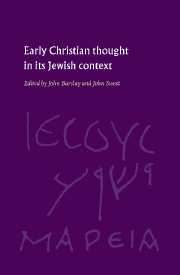Book contents
- Frontmatter
- Contents
- List of contributors
- Preface
- List of works by Morna D. Hooker
- List of abbreviations
- Chapter 1 Introductory Essay
- I THE SOCIAL CONTEXT OF EARLY CHRISTIANITY
- II SOME EARLY CHRISTIAN SOURCES
- Chapter 4 Jesus
- Chapter 5 Matthew
- Chapter 6 Mark
- Chapter 7 Luke–Acts
- Chapter 8 John
- Chapter 9 Paul
- Chapter 10 Deutero-Pauline letters
- Chapter 11 Hebrews
- Chapter 12 Revelation
- Chapter 13 Other early Christian writings: ‘Didache’, Ignatius, ‘Barnabas’, Justin Martyr
- III SOME EARLY CHRISTIAN THEMES
- Index of names
- Index of subjects
- Index of texts
Chapter 8 - John
from II - SOME EARLY CHRISTIAN SOURCES
Published online by Cambridge University Press: 22 September 2009
- Frontmatter
- Contents
- List of contributors
- Preface
- List of works by Morna D. Hooker
- List of abbreviations
- Chapter 1 Introductory Essay
- I THE SOCIAL CONTEXT OF EARLY CHRISTIANITY
- II SOME EARLY CHRISTIAN SOURCES
- Chapter 4 Jesus
- Chapter 5 Matthew
- Chapter 6 Mark
- Chapter 7 Luke–Acts
- Chapter 8 John
- Chapter 9 Paul
- Chapter 10 Deutero-Pauline letters
- Chapter 11 Hebrews
- Chapter 12 Revelation
- Chapter 13 Other early Christian writings: ‘Didache’, Ignatius, ‘Barnabas’, Justin Martyr
- III SOME EARLY CHRISTIAN THEMES
- Index of names
- Index of subjects
- Index of texts
Summary
Professor Morna D. Hooker's work evinces a discerning exegetical and theological interest in the relationship of Jesus and early Christianity to ancient Judaism, as serious and thorough as the break between them was to become. No document is more important for an understanding of their relationship, and the separation, than the Gospel of John.
The question of the Jews or Judaism in the Gospel of John has been investigated and revisited many times (see, for example, Smith 1990b). This intense interest is based on at least two factors: first, the recognition that this gospel originated within Judaism or at the nexus between Judaism and what was to be called Christianity; second, the awareness that the mutual antipathy between Jesus and the Jews, which grows throughout the Gospel and reaches its climax in the trial before Pilate, makes John seem an anti-Jewish, if not anti-Semitic, Gospel (see Culpepper 1992, esp. pp. 37–43; Epp. 1975; and Kysar 1993).
Both factors have emerged into prominence largely since the Second World War. The discovery of the Dead Sea Scrolls, and particularly the Community Rule, in 1947 led to the realization that the distinctive language and conceptuality of the Fourth Gospel was not foreign to first-century Palestine, and certainly not to Judaism (Brown 1958; Charlesworth 1968–69, 1990). This realization in turn implied that the frequent references to the Jews in the Fourth Gospel should be taken as somehow related to its origin and purpose.
- Type
- Chapter
- Information
- Early Christian Thought in its Jewish Context , pp. 96 - 111Publisher: Cambridge University PressPrint publication year: 1996



